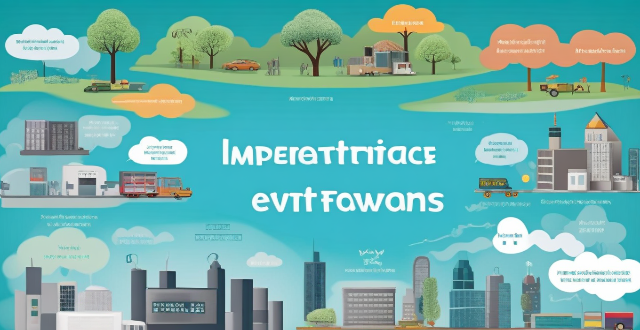The text discusses the importance of international cooperation in developing renewable energy policies worldwide. It highlights three main benefits: sharing knowledge and best practices, accessing financing and investment opportunities, and addressing global challenges such as climate change, air pollution, and energy security. Examples are provided for each benefit, including technical workshops, research collaborations, policy forums, multilateral development bank loans, green bonds, private sector partnerships, climate change agreements, joint research efforts, and energy security initiatives. The conclusion emphasizes that international cooperation is crucial for accelerating the transition to a more sustainable and equitable energy system.

The Role of International Cooperation in Shaping Renewable Energy Policies
International cooperation plays a crucial role in shaping renewable energy policies around the world. By working together, countries can share knowledge, resources, and expertise to develop more effective and sustainable energy systems. In this article, we will explore the different ways in which international cooperation contributes to the development of renewable energy policies.
Sharing Knowledge and Best Practices
One of the key benefits of international cooperation is the opportunity to share knowledge and best practices. Countries can learn from each other's successes and failures, as well as adapt proven strategies to their own unique circumstances. This can lead to faster adoption of renewable energy technologies and more efficient use of resources.
Examples of Knowledge Sharing:
- Technical Workshops and Training Programs: Countries can organize workshops and training programs to exchange technical knowledge on renewable energy technologies such as solar panels, wind turbines, and geothermal systems.
- Research Collaborations: International research collaborations can help countries pool their scientific expertise to develop new renewable energy technologies or improve existing ones.
- Policy Forums: International policy forums provide a platform for countries to discuss and compare their renewable energy policies, identify areas for improvement, and share successful strategies.
Accessing Financing and Investment Opportunities
Another important aspect of international cooperation is accessing financing and investment opportunities for renewable energy projects. Many countries lack the financial resources needed to invest in large-scale renewable energy infrastructure. By collaborating with international organizations and private sector partners, they can secure funding for these projects.
Sources of Financing and Investment:
- Multilateral Development Banks: Institutions like the World Bank and Asian Development Bank offer loans and grants for renewable energy projects in developing countries.
- Green Bonds: Green bonds are a type of bond that specifically funds environmentally friendly projects, including renewable energy projects. Issuing green bonds can attract investors looking to support sustainable development.
- Private Sector Partnerships: Private companies can partner with governments to invest in renewable energy projects, providing both financial resources and technical expertise.
Addressing Global Challenges
International cooperation is essential for addressing global challenges related to renewable energy, such as climate change, air pollution, and energy security. By working together, countries can develop coordinated strategies to mitigate these challenges and promote sustainable development.
Examples of Addressing Global Challenges:
- Climate Change Agreements: International agreements like the Paris Agreement set targets for reducing greenhouse gas emissions and promoting renewable energy use. Countries commit to achieving these targets through their national policies and actions.
- Joint Research Efforts: International research efforts can focus on developing innovative solutions to address air pollution caused by fossil fuel combustion, such as advanced filtration technologies or cleaner burning fuels.
- Energy Security Initiatives: Energy security initiatives aim to reduce dependence on imported fossil fuels by increasing domestic production of renewable energy sources like solar, wind, and geothermal power.
In conclusion, international cooperation plays a vital role in shaping renewable energy policies by facilitating knowledge sharing, providing access to financing and investment opportunities, and addressing global challenges. By working together, countries can accelerate the transition to a more sustainable and equitable energy system.